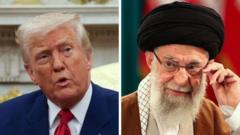In a significant policy shift, the British government has announced the easing of sanctions on several Syrian government entities that were initially imposed under former President Bashar al-Assad's regime. This move, revealed on April 24, 2025, indicates a growing response from Western nations to engage with Syria's new leadership following a substantial political transition.
Britain Eases Sanctions on Syrian Government Agencies to Foster Recovery

Britain Eases Sanctions on Syrian Government Agencies to Foster Recovery
Britain's recent decision to lift sanctions on key Syrian agencies marks a pivotal moment in the rebuilding efforts of the country after years of conflict.
The British Foreign, Commonwealth and Development Office updated its sanctions list, removing asset freezes on a dozen organizations, including vital defense and security departments, such as the interior and defense ministries and military intelligence. Additionally, Britain will also lift restrictions on various sectors, notably financial services and energy production, aimed at boosting investments necessary for rebuilding Syria's war-torn economy.
Hamish Falconer, a minister at the British Foreign Office responsible for Middle Eastern affairs, articulated the rationale behind this decision, emphasizing the importance of a stable Syria for Britain's national interests. "The Syrian people deserve the opportunity to rebuild their country and economy," he stated.
This policy change follows the establishment of a new caretaker government in Syria, led by President Ahmed al-Shara, who recently garnered support by leading the coalition that successfully overthrew the Assad regime. Al-Shara is now working to assure the international community that the new leadership has moved beyond its previous associations with extremist factions.
With this realignment in diplomatic relations, the UK aims to support a crucial period of transition in Syria, poised for a path toward recovery and stability.
Hamish Falconer, a minister at the British Foreign Office responsible for Middle Eastern affairs, articulated the rationale behind this decision, emphasizing the importance of a stable Syria for Britain's national interests. "The Syrian people deserve the opportunity to rebuild their country and economy," he stated.
This policy change follows the establishment of a new caretaker government in Syria, led by President Ahmed al-Shara, who recently garnered support by leading the coalition that successfully overthrew the Assad regime. Al-Shara is now working to assure the international community that the new leadership has moved beyond its previous associations with extremist factions.
With this realignment in diplomatic relations, the UK aims to support a crucial period of transition in Syria, poised for a path toward recovery and stability.




















